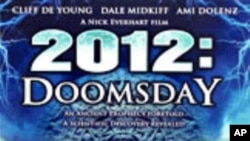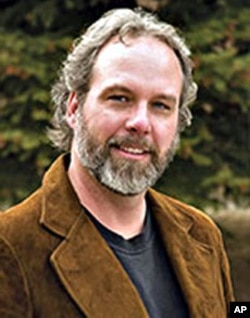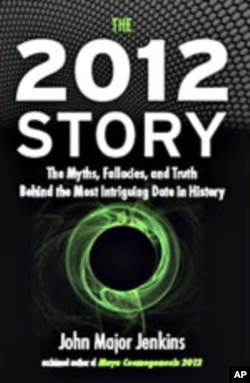On December 21, 2012, the 5,125 year cycle of the Mayan calendar will end. The ancient civilization, which reached its peak in the Yucatan and Central America a thousand years ago, predicted the date would be marked with a rare cosmic phenomenon. Some people speculate it will coincide with the destruction of the earth, others hope it will transform the world in more positive ways. But few know the whole story behind 2012.
Hollywood and 2012
Hollywood's latest blockbuster 2012 is about the imminent demise of the world. There are also websites, blogs, novels and songs trying to profit from the public's interest in the year 2012.
"The marketplace, the media, the mainstream media, is insisting that 2012 should be about doomsday or apocalypse," Maya scholar John Major Jenkins says.
The story behind the legend
In reality, he adds, the date has nothing to do with any of that. Jenkins directs the Center for 2012 Studies, a non-profit research group investigating Mayan timekeeping. In his new book, The 2012 Story, he explains what the year signifies in the Mayan calendar, which goes in cycles based on the moon, sun and other celestial bodies.
"The long count calendar of the Maya uses different cycles of periods based on 20 and I won't go into the mathematical details of it, but there is a large cycle in this calendar, it's referred to as '13 Baktun cycle' [and] it's 5125 years," he explains. "The calendar was created 2100 years ago, but the inventors of this calendar system projected backwards to a calculated or extrapolated beginning date of this cycle, which they associated with [their] creation mythology, that [modern] scholars have been able to identify as 3114 B.C. The end of this cycle then was projected forward to 2012 A.D."
Mayans were calculating movements in the galaxy
According to the Mayans, he says, the end of the cycle will coincide with a galactic alignment of the earth, the sun and the center of the galaxy.
"It has to do with a rare astronomical alignment - the slow shifting of the stars known as the Procession of the Equinoxes," he says. "This phenomenon is caused by the slow wobbling of the earth on its axis. One complete wobble takes 26,000 years. That's really the big news in terms of how impressive the ancient Maya science was."
However, Jenkins stresses, there is no evidence the Maya thought the cycle would end in Doomsday. That, he explains, is a modern notion.
"You know, the whole connection to this imagery of apocalypse or Armageddon can be traced specifically to an academic book, actually," he adds. "One might think that this idea got underway by popular writers or something like that, but actually, it was the great Maya scholar Michael Coe, archeologist, who in his 1966 book, The Maya, mentioned the upcoming cycle ending. It's actually the first time that the cycle ending was mentioned in print as well. He had made the calculation forward to the end of the cycle, and then also interpreted it through the filter of Christian Armageddon terminology."
Doomsday interpretation is relatively recent
That interpretation attracted a lot of popular attention.
"In the mid-1990s, there was a book called The Mayan Prophecies, that talked about how 2012 was supposed to be a time when more solar activity would be happening," he says. "The connection to other things, like invisible planets coming back into the solar system and all these ideas, really started to take off, and especially in the last five or six years, the whole Doomsday thing has really taken root," Jenkins says.
Talk about the end of the days, Jenkins notes, has been going on since the beginning of days.
"I think our own culture, Western civilization, the Judeo-Christian tradition, is steeped in a linear time philosophy that requires some kind of apocalyptic punch at the end of the process," he explains. "Even if you're not Jewish or Christian per se, one is still indoctrinated into this linear time. Also, we are beings who are born and will die. So we all have our own sort of apocalyptic end point, you might say the death process, which is a great mystery and it's probably the source of a lot of fear, whether it is conscious or unconscious, for a lot of people, in terms of their own mortality. So obviously, to utilize something like 2012 as a projection screen for these kinds of things is not that surprising," he says.
Myth offers opportunity to raise interest in astronomy
But 2012 is not just an ending, says, Robert Stencel, a professor at the University of Denver.
"It merely means that they reset the calendar and start again," he says. "So it's not only the end of a cycle, but the beginning of a new cycle."
Stencel says he considers the uproar over 2012 an opportunity to raise awareness about astronomy.
"Much as the current year is known as the International Year of Astronomy, celebrating the 400th anniversary of Galileo using the telescope to discover things in the universe," he says, "maybe 2012 should be another year of astronomy, where we can thank the Mayans for their contributions to knowledge."
Jenkins hopes all the attention will all encourage people to learn more about the ancient Maya and the true story behind the year 2012.









